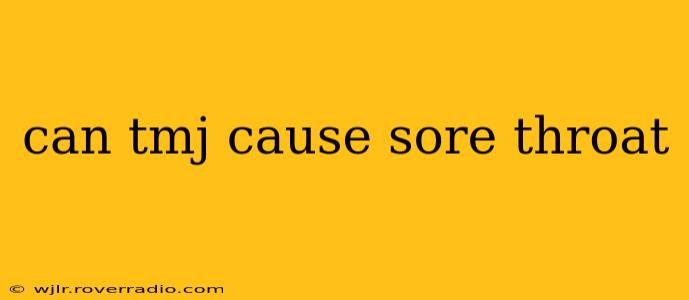Temporomandibular joint (TMJ) disorders can be incredibly frustrating, impacting not just your jaw but potentially other areas of your body. One common question many sufferers have is: can TMJ cause a sore throat? The answer is complex, and while TMJ itself doesn't directly cause a sore throat, there's a strong correlation and several indirect pathways that can lead to throat pain. Let's delve deeper into the potential connections.
How Might TMJ Lead to Throat Pain?
The link between TMJ and sore throat isn't always straightforward. It's not a direct causal relationship like a virus causing a sore throat. Instead, the relationship is often indirect, stemming from the interconnectedness of muscles and nerves in the head and neck. Here are some potential explanations:
-
Muscle Tension and Referrals: TMJ disorders often involve significant muscle tension in the jaw, face, and neck. This tension can radiate outwards, causing pain in seemingly unrelated areas. The muscles of the throat are close to those affected by TMJ, and the pain can be "referred" to the throat, mimicking a sore throat. This referred pain is a common phenomenon where pain is felt in a location different from its source.
-
Postural Changes: Chronic TMJ pain might lead to changes in posture, such as forward head posture. This posture can strain the neck and throat muscles, contributing to tightness, discomfort, and even pain that feels like a sore throat.
-
Inflammation: Inflammation associated with TMJ can spread to adjacent tissues. While less common, inflammation in the jaw joint could theoretically contribute to throat irritation or inflammation.
-
Mouth Breathing: Some individuals with TMJ experience difficulties with mouth closure or discomfort when their mouth is closed. This can lead to mouth breathing, which can dry out the throat and potentially contribute to a sore or scratchy feeling.
-
Myofascial Pain Syndrome: This condition involves widespread pain due to muscle tension and trigger points. Since TMJ often involves myofascial pain, pain referral to the throat is a possibility.
Can TMJ Cause Throat Pain and Difficulty Swallowing (Dysphagia)?
While less frequent than a simple sore throat, some individuals with severe TMJ may experience difficulty swallowing, a condition called dysphagia. This is typically linked to the muscle tension and altered jaw movements associated with TMJ. The intricate network of muscles involved in swallowing can be affected by the tension spreading from the jaw.
What if I have TMJ and a Sore Throat?
If you are experiencing both TMJ pain and a sore throat, it's crucial to consult a medical professional. They can help determine the underlying cause of your sore throat and address the TMJ disorder simultaneously. A sore throat can have numerous causes, ranging from simple viral infections to more serious conditions, so a proper diagnosis is essential.
How Can I Tell if My Sore Throat is Related to TMJ?
Differentiating between a sore throat caused by TMJ and one caused by infection can be challenging. However, some clues might indicate a connection to TMJ:
- Jaw Pain and Stiffness: If your sore throat is accompanied by jaw pain, clicking, popping, or stiffness, TMJ is a likely suspect.
- Facial Muscle Tension: Noticeable tension in your facial or neck muscles might also suggest a link to TMJ.
- Pain Location: The location of the throat pain might offer a clue. Pain more concentrated towards the back of the throat and potentially radiating to the jaw might be related to TMJ.
How is TMJ Diagnosed and Treated?
A dentist or specialist in TMJ disorders (orofacial pain specialist) will typically diagnose TMJ. Diagnosis usually involves a physical examination, reviewing your medical history, and potentially imaging studies such as X-rays or MRI scans. Treatment options vary widely, ranging from simple lifestyle changes like stress reduction and improved posture to more involved approaches such as medication, physical therapy, splints, or even surgery in severe cases.
Remember, this information is for educational purposes only and does not constitute medical advice. Always consult with a healthcare professional for diagnosis and treatment of any medical condition.
